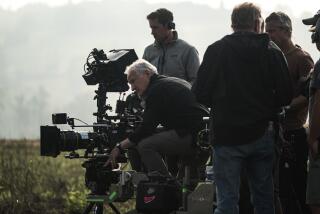Golf Hit Can’t Put Video Reel in the Green
- Share via
The maker of the best selling videocassette ever on playing golf is financially in the rough.
Sports video entrepreneur Bob Mann, who produced and starred in “Automatic Golf,” is struggling to pay $1.3 million owed to creditors by his Video Reel Inc., based in Valencia.
Three magazines which claim Video Reel owes them nearly $240,000 for advertising--Playboy, Psychology Today and Golf Digest--have gone so far as to petition in federal Bankruptcy Court to liquidate the company under Chapter 7 of the U.S. Bankruptcy Code.
Mann said Video Reel may be forced to voluntarily seek protection from creditors under Chapter 11 of the code, which would allow it to keep operating, if he can’t find a buyer for the company or work out an agreement with the creditors.
Despite being a relative unknown to the general public, the 51-year-old golf instructor and former top amateur player has sold about 500,000 copies of his tape since introducing it in December, 1982.
“It’s a bit of a phenomenon,” said James McCullough, home entertainment editor for Billboard Magazine, which tracks videocassette sales. McCullough said the tape, despite being four years old, remains at the top of the sales charts among videocassettes on sports and recreational subjects.
Mann planned to use the success of “Automatic Golf” to build what he envisioned as a sports video empire offering tapes, often starring himself, on such subjects as golf, karate, weight training and aerobics. Mann even recruited two former Miss Americas to be featured in his tapes.
Earlier this year, Mann circulated a business plan to potential investors claiming that Video Reel would ride the boom in the home video industry to the point where its sales would rise from only $1.7 million annually now to as much as $300 million by the early 1990s.
But despite the popularity of “Automatic Golf,” Mann’s financial problems have grown rapidly since the beginning of the year. For one thing, according to industry observers, Mann priced his videocassettes so cheaply--they now have a suggested retail price of $12.95--that he had to sell them in unrealistically huge volume to make substantial profits.
Short List of Titles
“His profit has to be very tight. You have royalties to pay and dollars go toward duplicating, packaging, promotions and overhead,” said Leslie Grey, executive editor of Home Video Publisher. Grey also said Mann’s company, which in addition to golf offers tapes on stretching, karate and weight lifting, has too few titles.
In addition, the video industry as a whole has been suffering a shakeout. In June, for example, Lorimar Telepictures disclosed a quarterly loss of $62.7 million. Some $31 million of the loss was attributed to its troubled home-video operations.
Mann, who owns 90% of Video Reel, said he made a mistake by trying to sell his tapes in a big way through health-food stores. He also said the privately held company has lacked funds.
Former executives and suppliers add that Mann has been unrealistically ambitious. Robert Flaherty, a former top sales executive, called Mann’s projections of hundreds of millions in sales “just absurd.”
Mann said the figures were based on projections of what kind of niche the company could achieve in the exploding home video market. He added, however, that “we never claimed to know” just how much business the company would eventually do.
Former executives and associates said that Mann seemed at times to be obsessed with promoting himself. Mann’s name and picture is displayed prominently on his tapes.
Signed Miss America
Debra Sue Maffett, the 1983 Miss America, said Mann promised her verbally that she would host a video program called “Instant Karate,” a 42-minute program made for $45,000 that has the look of an early morning television exercise show and which demonstrates basic kicks and punches for beginners.
Maffett said she was surprised later to learn that it was Mann who would be the host and that her role for the most part was confined to imitating moves he demonstrated.
“I found it odd that he would hire some former Miss America to host the tape and then find out he was the star,” Maffett said.
Maffett was paid $5,000 and promised two more $5,000 payments if the tape met certain sales goals. She said once she saw the tape she didn’t want to promote it.
“To be quite honest, I was embarrassed by the quality of the tape and hoped it wouldn’t be distributed,” Maffett said. “I didn’t want to make appearances to promote the tape.”
Mann accused Maffett of reneging on an agreement to publicize the “Instant Karate” tape. “Obviously, if she had helped us with publicity there would have been more dealer and consumer acceptance for the video,” Mann said.
2nd Deal Fell Through
Mann also had a falling out with another former Miss America, Susan Akin, who held the title for 1986. She was to have starred in an exercise tape this spring and had begun preparing for it by hiking and lifting weights with Mann.
Akin said she pulled out of the deal after Mann became angry with her one day for refusing to work out with him. Akin said she asked him if she could postpone the workout because she was tired after returning from an appearance with comedian Bob Hope show in Atlantic City, N.J.
Mann said the deal with Akin was ended because he was unable to reach an agreement with Akin’s agents and because he decided to instead make a weightlifting tape with a former “Miss Olympia” body-builder.
Mann, a native of Birmingham, Ala., started playing golf at age 13, competing as an amateur at 16. For $35 a person, Mann taught golf at two-hour seminars in hotels and country clubs across the country until someone suggested he videotape his presentation in 1982.
Quality Described as Poor
“Automatic Golf” is a 44-minute seminar that promises to “add 30-80 yards to your drive in 21 days.” In an article earlier this year, Sports Illustrated said Mann’s golf tape is “certainly not prospering because of its production quality.” One retailer is quoted in the article as describing the tape as having “kind of a living-room quality to it.”
Mann’s presentation emphasizes achieving power through better body movement, especially using the legs. Mann promotes himself as an expert in “sports bio-mechanical research,” or the study of body movements used in sports.
Ads for Mann’s “Isometric Stretch” videocassette on stretching once claimed he did work in the field at the University of Florida. But, according to university officials, he was merely a student majoring in physical education in the mid-1970s.
“We asked him to clarify his affiliation with the university in the ads,” said Gene Hemp, associate vice president for academic affairs.
Mann insists he did the work on his own when he was a student and describes it as “quite monumental.” Still, he agreed to change the ads.
“It was a minor issue. Why fight over the definition of the term of what I did?” he said.
Discounted Drastically
Mann aggressively sold “Automatic Golf,” continually slashing its original price of $69.95 to $12.95 now. He also emphasized sales to pro shops, sporting goods stores and mass merchandise stores such as K mart rather than video stores where customers often rent tapes rather than buy them.
According to Home Video Publisher, “Automatic Golf” ranks first in sales among golf instructional videos in number of cassettes sold and ranks eighth among all videocassettes sold, not counting those of feature-length motion pictures. Among instructional videocassettes, the tape is eclipsed in sales only by three videocassettes featuring actress Jane Fonda’s aerobic workouts.
Mann’s videocassette, which cost about $70,000 to produce and has grossed nearly $5 million for his company, has even outsold golf instructional tapes starring such well-known professionals as Jack Nicklaus, Al Geiberger and Billy Casper. Newsletter editors note, however, that the Nicklaus tape, a two-cassette package that retails for nearly $90, had outgrossed Mann’s tape by nearly $1 million.
Mann said that his creditors have been cooperative in trying to work out an informal financial reorganization for Video Reel, except for the three magazines trying to force the company into liquidation.
2 Plans Offered
His attorney, Laurence D. Merritt, said that creditors were offered 30 cents on the dollar for their debts and that some creditors, such as suppliers who agreed to continuing supplying the company, received more. He said the company has about $500,000 in assets, or enough to pay creditors about 7 cents on the dollar if it is forced to liquidate.
Thomas Zide, who represents the magazines, said they plan to proceed with pressing for liquidation, adding that he believes it is unfair for Video Reel to offer some creditors better terms if they cooperate.
“In the credit field, when you offer terms in an informal plan of reorganization you normally submit the same offer to all creditors and all creditors are to be treated equally,” he said.


